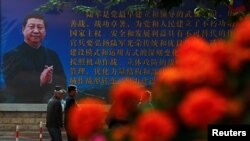The Communist Party of China has approved a new set of rules that will soon place the party’s half a million corruption investigators under stricter supervision.
The intra-party regulation, passed Sunday at the close of its Central Commission for Discipline Inspection’s (CCDI) annual plenary meeting, aims to standardize graft probes so as to ensure an unsullied disciplinary team.
Analysts, however, are skeptical, saying that such self-supervision rules may not be effective in exposing corrupt investigators, although they do serve to ensure party members are obedient to the incumbent leadership under Chinese president Xi Jinping.
Standardized investigative procedures
As details are yet to be released, the rules are said to be setting clear standards on how to handle corruption tips, how to check and review cases and how to manage ill-gotten gains or assets, according to a report published on the commission's website on Sunday.
Investigators will also be advised to keep audio and video recordings throughout their interrogation processes while creating a registration system for those who make inquiries about, or try to interfere in their cases, the report added.
“Trust (in disciplinary officials) cannot replace supervision," said a meeting communique released on Sunday. “We must make sure the power granted by the party and the people is not abused."
Addressing a media briefing on Monday, Wu Yuliang, deputy secretary of CCDI, further reiterated party chairman Xi’s determination to crack down on both “tigers” and “flies” – powerful leaders and grass-root bureaucrats.
He added that the party's fight against corruption has gained a “crushing momentum” and “huge progress” following surveys indicating a 93 percent approval rate for the party’s anti-graft drive, up from 75 percent in 2012.
“The goal of ensuring officials dare not corrupt has been achieved and the system of ensuring officials will not corrupt has been in place," Wu quoted Xi as saying. “We are building a dam to ensure that officials won’t attempt to [be] corrupt.”
According to Wu, the party disciplined 0.43 percent of its 88 million party members in 2016, compared to 0.18 percent of its 85 million party members in 2012. He aded that about 2,500 corrupt officials who fled oversea have been extradited and coughed up a total of 8.64 billion Yuan (US$1.25 billion) in embezzled money over the past four years.
When asked if China will facilitate a supervisory system, which acts independently and without having to report to the party, Wu said that such a system will be ill-suited in the Chinese-style socialist system, under which both the party’s disciplinary committee and the national supervision commission will remain party-led.
Reporting to the parliament, the national supervision commission is designated to oversee public office holders, including within the court system.
Wu also revealed the National Party’s Congress is drafting a national law to provide an integrated legal footing for the nation’s anti-corruption campaign.
Doubts cast on the rules
Commenting on the party’s self-supervision rules, Jean-Pierre Cabestan, political science professor at Hong Kong Baptist University, said they only address concerns that anti-corruption investigators have become too powerful and there were no rules to limit or prevent them from abusing their powers.
But whether the rules will work to better control CCDI members or separate the investigation of anti-corruption officials from prosecution remains to be seen, the professor added.
On the political front, he said such rules will help Xi strengthen his power, using the top anti-corruption watchdog to enhance political discipline while fighting against rival factions, which are opposed to him or have slowed down his implementation of reforms nationwide.
“The disciplinary inspection work is not only kind of business to make party members and party leaders clean, but also make them obedient to the current political leadership,” Cabestan told VOA.
Sharing a similar view, Ren Jianming, director of the anti-corruption and governance research center at Tsinghua University in Beijing, said it is impossible for such self-supervision rules alone to have an effective check on CCDI members if no external supervision is in place to provide oversight.
“What we call external [supervision] on CCDI members include oversight from the party’s future national congress, its delegates or through its intra-party democratization as well as other apparatuses such as an [independent] judicial system or other special task forces,” Ren said.
Meanwhile, the promotion of Li Shulei, formerly Xi’s speechwriter, as head of Beijing’s anti-graft watchdog has confirmed Xi’s plan to tighten his control over the party’s control apparatus since Li, albeit a new blood, is someone he can trust, said professor Cabestan.
The professor added that he expects Xi to find ways to retain Wang Qishan as head of CCDI after the party’s 19th National Congress, which is slated to take place in the second half of this year, despite the 68-year-old Wang having exceeded his retirement age.







